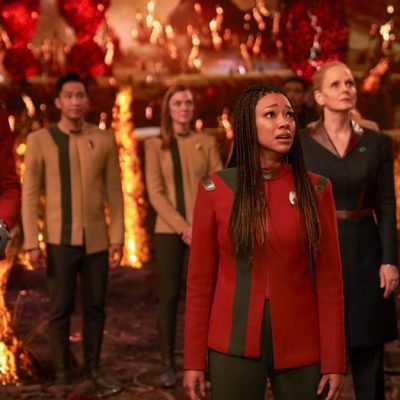Star Trek: Discovery has come a long way since its debut in 2017. With the latest season, this prequel-turned-sequel has finally found its footing, delivering a compelling story that combines the best of Star Trek’s past with modern storytelling techniques.
After the tumultuous journey of the first three seasons, Star Trek: Discovery’s fourth season has embraced its place in the franchise. The show finally settles on what it wants to be, acknowledging the legacy of previous Star Trek series without relying on constant references. Instead, it focuses on a unique and original story that many consider to be one of the best in recent Star Trek history.
Rebuilding the Federation
Season 4 sees the crew of the USS Discovery facing a new challenge – rebuilding the Federation in the 32nd century. With the time jump in the third season, the show found new creative freedom, free from the constraints of being a prequel. This allowed showrunners Alex Kurtzman and Michelle Paradise to explore the potential of the unknown temporal period and the concept of a Federation on the path to reunification.
A familiar yet compelling story
At first glance, the season’s main plot seems like a typical Discovery story arc: a galaxy-wide threat that requires the combined efforts of the main crew and the remnants of Starfleet. However, the season’s narrative focus is on communication, with subplots and character arcs revolving around the challenges, pain, and joy of interacting with one another.
Michael Burnham: From outsider to captain
The series’ central character, Michael Burnham, has experienced a significant transformation over the course of four seasons. Now occupying the captain’s chair, Burnham has finally found her place in both the narrative and the in-universe hierarchy. This change resolves some of the issues from previous seasons, allowing Burnham’s decision-making to feel more natural and in line with her character’s growth.
Character development takes centre stage
One of the most significant improvements in Star Trek: Discovery’s fourth season is the increased emphasis on character development. The ensemble cast gets the opportunity to explore their characters’ relationships and emotions, resulting in a more engaging and emotionally resonant season. It has to be said that characters blurting out bits of their backstory is jarring, but at least we are finally getting to know them.
The often-underutilised bridge crew are given more screen time this season and opportunities for character development. Characters like Detmer, Owo, Rhys, Bryce, and Nilsson have standout moments throughout the season, with the episode ‘All In’ being a particularly powerful showcase for Owo. Additionally, Adira steps into the role vacated by Tilly, providing a new and improved dynamic for the character.
The performances of the Star Trek: Discovery cast have consistently been a highlight of the series, and season 4 is no exception. Sonequa Martin-Green continues to impress as Michael Burnham, while Doug Jones, Wilson Cruz, and David Ajala deliver exceptional performances as Saru, Culber, and Book, respectively. The strong ensemble work helps elevate the season’s storytelling and emotional impact.
While character development takes centre stage in season 4, Star Trek: Discovery continues exploring new worlds and concepts.
The Dark Matter Anomaly and Species 10-C
The central mystery of season 4 revolves around the Dark Matter Anomaly (DMA) and the enigmatic Species 10-C. This storyline is a prime example of a classic Star Trek concept, combining scientific intrigue with a sense of wonder and exploration. The DMA and Species 10-C storyline is both engaging and thought-provoking, keeping viewers invested in the season’s overarching narrative.
Episodic storytelling returns
Season 4 also sees a return to episodic storytelling, with several standout episodes that showcase the show’s ability to explore new and unfamiliar worlds. Episodes like ‘All In’ and ‘Rosetta’ capture the spirit of Star Trek’s exploration-focused past while maintaining the character-driven storytelling of modern television.
The fourth season manages to strike a balance between classic Star Trek themes and the demands of modern television. Episodes like ‘Stormy Weather’ highlight this balance, demonstrating that the spirit of Star Trek remains strong in its latest incarnation. The focus on empathy, communication, and unity is timely and true to the franchise’s core values.
Addressing the Show’s Flaws
While season 4 of Star Trek: Discovery is arguably the strongest yet, it has flaws. Some issues from previous seasons persist, such as an overcrowded cast and uneven pacing. Characters like Adira and Grey suffer from underdevelopment, and the show’s tendency to focus on characters just before their departure remains an issue.
However, these flaws are mitigated by improvements in storytelling, character development, and thematic focus. The fourth season demonstrates that the show’s creators have learned from past mistakes and are committed to delivering a better Star Trek experience.
The future is bright for Star Trek: Discovery
In its fourth season, Star Trek: Discovery has finally established itself as a worthy addition to the Star Trek franchise. With improved storytelling, character development, and a renewed focus on the themes that define Star Trek, the show has found its footing and is poised for continued success.
The series has already been renewed for a fifth season, with production set to begin in June 2022. As Star Trek: Discovery continues to evolve and grow, fans can look forward to more adventures exploring the final frontier and delving into the complex relationships and emotions of its characters.









Leave a Reply